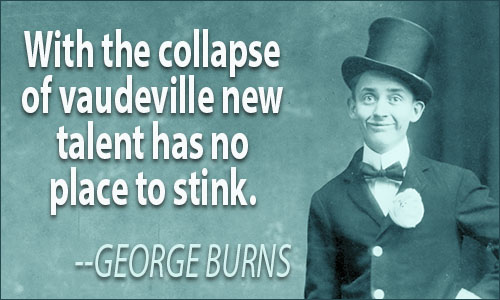VAUDEVILLE QUOTES
quotations about vaudeville

Notice: Undefined variable: id in /hermes/walnacweb03/walnacweb03ak/b2149/pow.notablequote/htdocs/v/includes/quoter_subj.php on line 27
Live vaudeville was once the leading form of American entertainment--until talkies killed it. But it was a training ground for movie icons like the Marx Brothers, Buster Keaton, Fred Astaire, Mae West, Eddie Cantor, Judy Garland, and even Cary Grant.
ANONYMOUS
Notice: Undefined variable: id in /hermes/walnacweb03/walnacweb03ak/b2149/pow.notablequote/htdocs/v/includes/quoter_subj.php on line 37
NY Blueprint, September 24, 2016
Notice: Undefined variable: id in /hermes/walnacweb03/walnacweb03ak/b2149/pow.notablequote/htdocs/v/includes/quoter_subj.php on line 63
Vaudeville was, in short, the absolute contradiction of classicism.
PETER JELAVICH
Munich and Theatrical Modernism
Vaudeville, whatever its asininity, was at least to be taken casually and the worse it was the more jocular it seemed to fellows who didn't mind throwing away a dollar.
GEORGE JEAN NATHAN
"On Vaudeville", The World of George Jean Nathan: Essays, Reviews, & Commentary
Vaudeville was killed by television but it changed the role of comedy, ultimately expanding it.
TERRY DATE
"So these five comedians walk into a bar ...", Eagle Tribune, February 19, 2017
The audience was always willing to be entertained, to celebrate the king of the day, thus unexpectedly modifying the course of the performance. By definition the vaude had no rigid pattern of development; it always allowed for the possibility of a dialogue between those who were in the house and those who were on the stage.
NICOLE VIGOUROUX-FREY
"Charlie Chaplin or the Vaudeville Dispossessed", Charlie Chaplin: His Reflection in Modern Times
It is not that the old-time vaudeville show was a good show; it often, certainly, was anything but that. It was rather that it had an innocence and artlessness that made it appealing to men who prefer to take their diversion in an easy-come-easy-go fashion instead of in the railroad-schedule manner imposed upon them by present-day theatrical managers and traffic cops.
GEORGE JEAN NATHAN
"On Vaudeville", The World of George Jean Nathan: Essays, Reviews, & Commentary
Vaudeville is dead. The acrobats, the animal acts, the dancers, the singers, and the old-time comedians have taken their final bows and disappeared into the wings of obscurity. For fifty years--from 1875 to 1925--vaudeville was the popular entertainment of the masses. Nomadic tribes of nondescript players roamed the land. The vaudeville actor was part gypsy and part suitcase. With his brash manner, flashy clothes, capes and cane, and accompanied by his gaudy womenfolk, the vaudevillian brought happiness and excitement to the communities he visited.
FRED ALLEN
Much Ado About Me
There were a great many in vaudeville -- people who never quite came through. But they had their place, and they filled it. They kept theatres open. Those pan-timers, those interstate-timers, those four-a-dayers, those six-a-dayers -- they were an integral part of that endearing merry-go-round called vaudeville.
ALFRED LUNT
attributed, American Vaudeville as Seen By Its Contemporaries
Vaudeville was not about telling stories; it was about putting on a show, and more than that, it was about each performer's individual attempt to stop the show and steal the applause.
HENRY JENKINS
The Wow Climax: Tracing the Emotional Impact of Popular Culture
You had people of all different stripes co-mingling backstage -- men, women, all different racial, ethnic and religious groups. Vaudeville was the way for the lower classes to get out of poverty. It was looked down on by the middle and upper classes -- it was considered a little bit sleazy, but you could make really good money if you were talented.
JULIETTE FAY
"Broome County's vaudeville history inspires new novel", Press Connects, July 1, 2016
With the collapse of vaudeville new talent has no place to stink.
GEORGE BURNS
attributed, The Mammoth Book of Humor
Vaudeville was more than an assembly of ragtime pantaloons, topical monologists, eccentric dancers, barrelhouse songbirds, ventriloquists, magicians, tumblers and jugglers, more than a coast-to-coast network of once-gilded theaters now shambling into plaster dust. Vaudeville was a people's culture.
FRANK CULLEN
Vaudeville Old & New
The good thing about vaudeville was that if you didn't like the first act, there was always something different in the next.
SAM STANTON
"Vaudeville acts in Sacramento included Marx Brothers", Sacramento Bee, February 11, 2017
Vaudeville was not quite what people today think it was; it suffers from the fact that no visual or audio record of it has survived. There is no film to speak of, no videotape. Legitimate plays and musical comedies can be revived; film, even silent film, has endured to a substantial degree. But vaudeville is gone!
CHARLES W. STEIN
American Vaudeville as Seen By Its Contemporaries
Muppets. They taught us to count, the value of diversity, and what vaudeville was.
RICHARD WHITTAKER
"The Wonderful World of Frank Oz", Austin Chronicle, March 10, 2017
Vaudeville established itself firmly on the map of popular amusements in three concrete ways: the devolopment of commercial circuits, the stabilization of a programming mode, and the establishment of permanent vaudeville houses in the big-city centers. Vaudeville's centrality and dispersal over a vast territory was a means of disseminating entertainment. The infrastructure for the movie industry was laid out with the early vaudeville shows.
JOANNE STOBER
"Vaudeville", Residual Media
Vaudeville was perhaps the best leisure time deal of this century. For 15 cents, the cost of a balcony seat, one could while away three hours with seven acts of some of the greatest traveling entertainment in the country. From the Kita Banzaii Jap Acrobatic Family to Ethel Barrymore in a one-act dramatic playlet, vaudeville had something for everybody.
WILL AHERN & EDDIE PARKS
"Sawdust Memories", September 1980
Vaudeville was to variety what "darn" is to "damn."
CHANNING POLLOCK
attributed, Silent Film Sound
When vaudeville was over ... who'd hire an inept but buxom contortionist?
ELIZABETH MCCRACKEN
Niagara Falls All Over Again
From the 1880s to the 1910s, vaudeville was the most popular form of entertainment in the country.... Under its broad umbrella sheltered circus and minstrel acts but with a veneer of glamor and respectability that the dime museum never had.
ROBERT M. LEWIS
From Traveling Show to Vaudeville: Theatrical Spectacle in America, 1830-1910